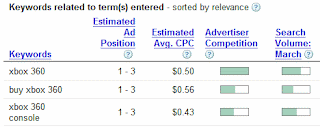If you are running an Adwords campaign you know you are constantly managing your keyword's maximum CPC in order to keep your ad running in the top positions. But how can you decide what is the best value for Max. CPC?
When starting a new ad you decide the maximum price you are willing to pay for clicks for each of the used keywords. The price has to be above a minimum price which depends on the amount of other advertisers using the same keyword. If your bid is below this minimum you will be notified of this so you can increase your price.
Once your ad is running and you start getting clicks you can see how well your ad is doing and on which position your ad is showing. If your ad is performing well and has a high clickthrough rate your ad will be shown on a higher position. If your clickthrough rate is lower then the ads of your competitors your ad will be shown on a lower position. To get your ad to show higher than your competitors ad you can try to increase the clickthrough rate or bid a higher price.
You can raise and lower your CPC's by trial and error but there is a way to check what the expected CPC for a keyword is. You can do this as follows:
- Click on "Tools" and then "Keyword tool"
- Perform a search for the keyword you want to check
 Now you will see estimated CPC and Ad position.
Now you will see estimated CPC and Ad position.
You can use this information to see if the CPC you are paying is in range of these prices. If your price is a lot higher you could try and lower your price. Experiment with diferent maximum prices and check the amount of expected clicks. If the clicks stay high enough you can try and lower your max. CPC.
